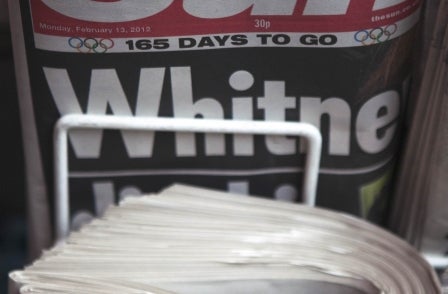
A senior Sun journalist has revealed that Page Three may not survive in its current form.
The issue of topless pictures appearing on Page Three of The Sun has been highlighted over the last year by the No More Page Three campaign which has so far attracted more than 125,000 names to a petition against it.
Page Three was a topic of discussion at a media breakfast hosted by News UK this morning to trumpet the fact that the company has promoted a number of women to senior editorial positions helping to counter the traditional gender imbalance on Fleet Street.
Press Gazette asked the assembled executives how Page Three sits alongside News UK’s commitment to promote women and tackle sexism.
Chief marketing officer Katie Vanneck-Smith, who was hosting the breakfast, referred the question to the editor of the Sun on Sunday’s Fabulous magazine Rachel Richardson.
She said: “[Sun editor] David Dinsmore has been quite clear about the fact that it’s here to stay. But that doesn’t mean it’s definitely going to stay the way it is.”
Richardson has been dealing with the No More Page Three campaign on behalf of The Sun and is currently helping to review the page.
She said: “It will stay because it’s a pillar of The Sun. I’ve sat through hours of focus groups and the readers love it.
“They would feel very different about The Sun if it wasn’t there. But it doesn’t have to be like the Page Three picture that’s here today.”
The Sun does not currently publish topless Page Three pictures on Saturdays and Sundays and Richardson said: “What we do in the week might change.”
Also attending the breakfast was Emma Tucker, who was made deputy editor of The Times last month, and Eleanor Mills – who was promoted to editorial director of the paper at the same time. Sarah Baxter was made deputy editor of the Sunday Times in June and Victoria Newton was made editor of the Sun on Sunday in September.
Newton defended Page Three. Holding up a topless photo of Kate Moss, which appeared in an edition of Vogue, she said: “I don’t see why that’s different. If readers still want it, we’d be crazy to change it.”
The executives at the breakfast also spoke of the challenges of balancing family life with demanding editorial jobs and seemed to agree that a long hours newsdesk culture meant women journalists tended to gravitate towards features roles after they had children.
Mills said she was able to balance work and family life when her children were younger because Sunday Times editor John Witherow allowed her to edit the News Review section of the paper three and a half days a week.
Tucker was at the FT when her children were born and said she managed to keep her career going through a combination of job share, working from home, part-time working and taking a year off.
She said: “It got me through the pinch point to where the kids were older and I could go back full-time.”
Email pged@pressgazette.co.uk to point out mistakes, provide story tips or send in a letter for publication on our "Letters Page" blog
